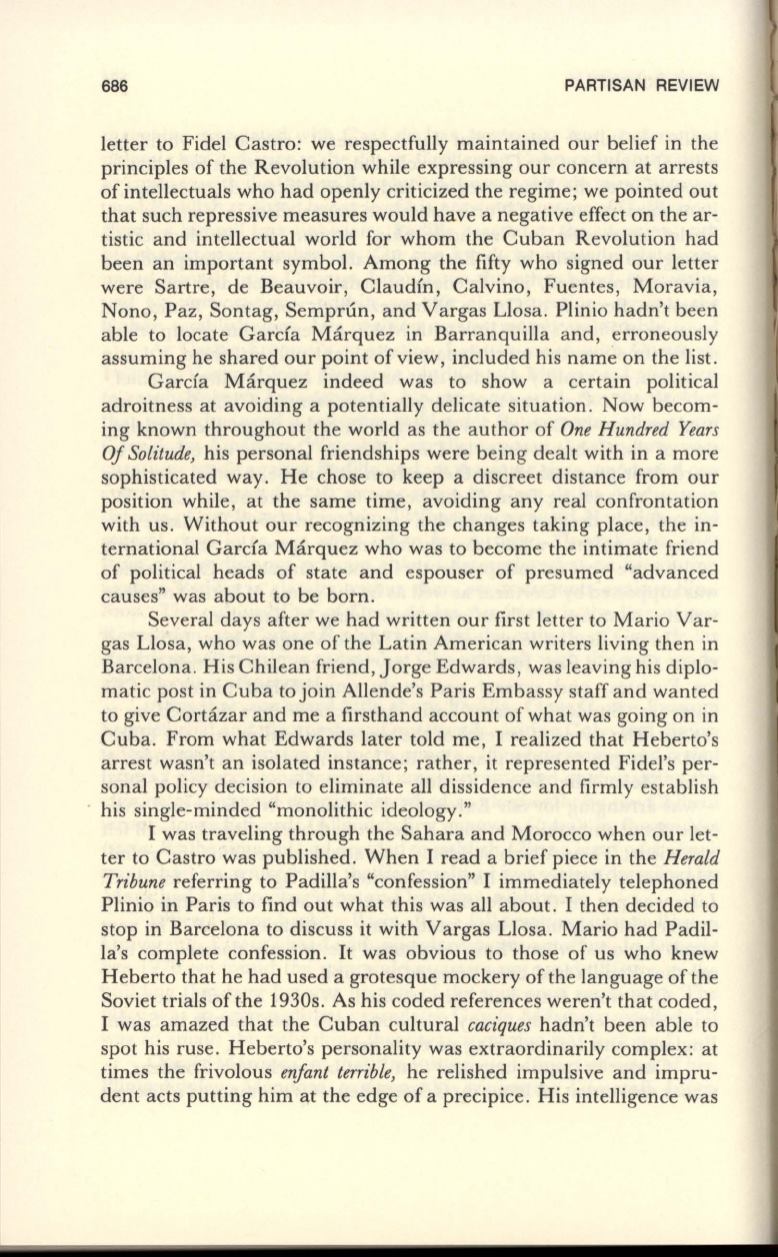
686
PARTISAN REVIEW
letter to Fidel Castro: we respectfully maintained our belief in the
principles of the Revolution while expressing our concern at arrests
of intellectuals who had openly criticized the regime; we pointed out
that such repressive measures would have a negative effect on the ar–
tistic and intellectual world for whom the Cuban Revolution had
been an important symbol. Among the fifty who signed our letter
were Sartre, de Beauvoir, Claudfn, Calvino, Fuentes, Moravia,
Nono, Paz, Sontag, Semprun, and Vargas Llosa. Plinio hadn't been
able to locate Garda Marquez in Barranquilla and, erroneously
assuming he shared our point of view' included his name on the list.
Garda Marquez indeed was to show a certain political
adroitness at avoiding a potentially delicate situation. Now becom–
ing known throughout the world as the author of
One Hundred Years
OJ Solitude,
his personal friendships were being dealt with in a more
sophisticated way. He chose to keep a discreet distance from our
position while, at the same time, avoiding any real confrontation
with us. Without our recognizing the changes taking place, the in–
ternational Garda Marquez who was to become the intimate friend
of political heads of state and espouser of presumed "advanced
causes" was about to be born.
Several days after we had written our first letter to Mario Var–
gas Llosa, who was one of the Latin American writers living then in
Barcelona. His Chilean friend, Jorge Edwards, was leaving his diplo–
matic post in Cuba to join Allende's Paris Embassy staff and wanted
to give Cortazar and me a firsthand account of what was going on in
Cuba. From what Edwards later told me, I realized that Heberto's
arrest wasn't an isolated instance; rather, it represented Fidel's per–
sonal policy decision to eliminate all dissidence and firmly establish
his single-minded "monolithic ideology."
I was traveling through the Sahara and Morocco when our let–
ter to Castro was published. When I read a brief piece in the
Herald
Tribune
referring to Padilla's "confession" I immediately telephoned
Plinio in Paris to find out what this was all about. I then decided to
stop in Barcelona to discuss it with Vargas Llosa. Mario had Padil–
la's complete confession. It was obvious to those of us who knew
Heberto that he had used a grotesque mockery of the language of the
Soviet trials of the 1930s. As his coded references weren't that coded,
I was amazed that the Cuban cultural
caciques
hadn't been able to
spot his ruse. Heberto's personality was extraordinarily complex: at
times the frivolous
enfant terrible,
he relished impulsive and impru–
dent acts putting him at the edge of a precipice. His intelligence was


